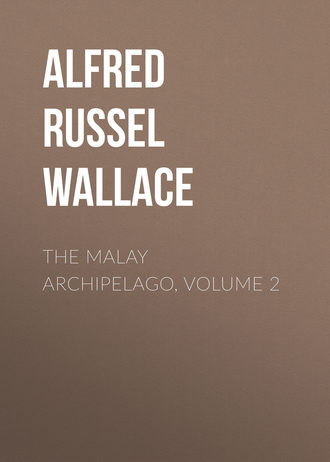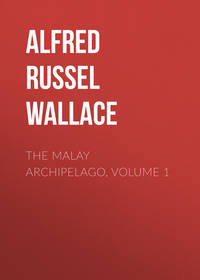 полная версия
полная версияThe Malay Archipelago, Volume 2
This is one of those spots so hard for the European naturalist to conceive, where with all the riches of a tropical vegetation, and partly perhaps from the very luxuriance of that vegetation, insects are as scarce as in the most barren parts of Europe, and hardly more conspicuous. In temperate climates there is a tolerable uniformity in the distribution of insects over those parts of a country in which there is a similarity in the vegetation, any deficiency being easily accounted for by the absence of wood or uniformity of surface. The traveller hastily passing through such a country can at once pick out a collecting ground which will afford him a fair notion of its entomology. Here the case is different. There are certain requisites of a good collecting ground which can only be ascertained to exist by some days' search in the vicinity of each village. In some places there is no virgin forest, as at Djilolo and Sahoe; in others there are no open pathways or clearings, as here. At Batchian there are only two tolerable collecting places,—the road to the coal mines, and the new clearings made by the Tomóre people, the latter being by far the most productive. I believe the fact to be that insects are pretty uniformly distributed over these countries (where the forests have not been cleared away), and are so scarce in any one spot that searching for them is almost useless. If the forest is all cleared away, almost all the insects disappear with it; but when small clearings and paths are made, the fallen trees in various stages of drying and decay, the rotting leaves, the loosening bark and the fungoid growths upon it, together with the flowers that appear in much greater abundance where the light is admitted, are so many attractions to the insects for miles around, and cause a wonderful accumulation of species and individuals. When the entomologist can discover such a spot, he does more in a mouth than he could possibly do by a year's search in the depths of the undisturbed forest.
The next morning we left early, and reached the mouth of the little river in about au hour. It flows through a perfectly flat alluvial plain, but there are hills which approach it near the mouth. Towards the lower part, in a swamp where the salt-water must enter at high tides, were a number of elegant tree-ferns from eight to fifteen feet high. These are generally considered to be mountain plants, and rarely to occur on the equator at an elevation of less than one or two thousand feet. In Borneo, in the Aru Islands, and on the banks of the Amazon, I have observed them at the level of the sea, and think it probable that the altitude supposed to be requisite for them may have been deduced from facts observed in countries where the plains and lowlands are largely cultivated, and most of the indigenous vegetation destroyed. Such is the case in most parts of Java, India, Jamaica, and Brazil, where the vegetation of the tropics has been most fully explored.
Coming out to sea we turned northwards, and in about two hours' sail reached a few huts, called Langundi, where some Galela men had established themselves as collectors of gum-dammar, with which they made torches for the supply of the Ternate market. About a hundred yards back rises a rather steep hill, and a short walk having shown me that there was a tolerable path up it, I determined to stay here for a few days. Opposite us, and all along this coast of Batchian, stretches a row of fine islands completely uninhabited. Whenever I asked the reason why no one goes to live in them, the answer always was, "For fear of the Magindano pirates." Every year these scourges of the Archipelago wander in one direction or another, making their rendezvous on some uninhabited island, and carrying devastation to all the small settlements around; robbing, destroying, killing, or taking captive all they nee with. Their long well-manned praus escape from the pursuit of any sailing vessel by pulling away right in the wind's eye, and the warning smoke of a steamer generally enables them to hide in some shallow bay, or narrow river, or forest-covered inlet, till the danger is passed. The only effectual way to put a stop to their depredations would be to attack them in their strongholds and villages, and compel them to give up piracy, and submit to strict surveillance. Sir James Brooke did this with the pirates of the north-west coast of Borneo, and deserves the thanks of the whole population of the Archipelago for having rid them of half their enemies.
All along the beach here, and in the adjacent strip of sandy lowland, is a remarkable display of Pandanaceae or Screw-pines. Some are like huge branching candelabra, forty or fifty feet high, and bearing at the end of each branch a tuft of immense sword-shaped leaves, six or eight inches wide, and as many feet long. Others have a single unbranched stem, six or seven feet high, the upper part clothed with the spirally arranged leaves, and bearing a single terminal fruit ac large as a swan's egg. Others of intermediate size have irregular clusters of rough red fruits, and all have more or less spiny-edged leaves and ringed stems. The young plants of the larger species have smooth glossy thick leaves, sometimes ten feet long and eight inches wide, which are used all over the Moluccas and New Guinea, to make "cocoyas" or sleeping mats, which are often very prettily ornamented with coloured patterns. Higher up on the bill is a forest of immense trees, among which those producing the resin called dammar (Dammara sp.) are abundant. The inhabitants of several small villages in Batchian are entirely engaged in searching for this product, and making it into torches by pounding it and filling it into tubes of palm leaves about a yard long, which are the only lights used by many of the natives. Sometimes the dammar accumulates in large masses of ten or twenty pounds weight, either attached to the trunk, or found buried in the ground at the foot of the trees. The most extraordinary trees of the forest are, however, a kind of fig, the aerial roots of which form a pyramid near a hundred feet high, terminating just where the tree branches out above, so that there is no real trunk. This pyramid or cone is formed of roots of every size, mostly descending in straight lines, but more or less obliquely-and so crossing each other, and connected by cross branches, which grow from one to another; as to form a dense and complicated network, to which nothing but a photograph could do justice (see illustration at Vol. I. page 130). The Kanary is also abundant in this forest, the nut of which has a very agreeable flavour, and produces an excellent oil. The fleshy outer covering of the nut is the favourite food of the great green pigeons of these islands (Carpophaga, perspicillata), and their hoarse copings and heavy flutterings among the branches can be almost continually heard.
After ten days at Langundi, finding it impossible to get the bird I was particularly in search of (the Nicobar pigeon, or a new species allied to it), and finding no new birds, and very few insects, I left early on the morning of April 1st, and in the evening entered a river on the main island of Batchian (Langundi, like Kasserota, being on a distinct island), where some Malays and Galela men have a small village, and have made extensive rice-fields and plantain grounds. Here we found a good house near the river bank, where the water was fresh and clear, and the owner, a respectable Batchian Malay, offered me sleeping room and the use of the verandah if I liked to stay. Seeing forest all round within a short distance, I accepted his offer, and the next morning before breakfast walked out to explore, and on the skirts of the forest captured a few interesting insects.
Afterwards, I found a path which led for a mile or more through a very fine forest, richer in palms than any I had seen in the Moluccas. One of these especially attracted my attention from its elegance. The stein was not thicker than my wrist, yet it was very lofty, and bore clusters of bright red fruit. It was apparently a species of Areca. Another of immense height closely resembled in appearance the Euterpes of South America. Here also grew the fan-leafed palm, whose small, nearly entire leaves are used to make the dammar torches, and to form the water-buckets in universal use. During this walk I saw near a dozen species of palms, as well as two or three Pandani different from those of Langundi. There were also some very fine climbing ferns and true wild Plantains (Musa), bearing an edible fruit not so large as one's thumb, and consisting of a mass of seeds just covered with pulp and skin. The people assured me they had tried the experiment of sowing and cultivating this species, but could not improve it. They probably did not grow it in sufficient quantity, and did not persevere sufficiently long.
Batchian is an island that would perhaps repay the researches of a botanist better than any other in the whole Archipelago. It contains a great variety of surface and of soil, abundance of large and small streams, many of which are navigable for some distance, and there being no savage inhabitants, every part of it can be visited with perfect safety. It possesses gold, copper, and coal, hot springs and geysers, sedimentary and volcanic rocks and coralline limestone, alluvial plains, abrupt hills and lofty mountains, a moist climate, and a grand and luxuriant forest vegetation.
The few days I stayed here produced me several new insects, but scarcely any birds. Butterflies and birds are in fact remarkably scarce in these forests. One may walk a whole day and not see more than two or three species of either. In everything but beetles, these eastern islands are very deficient compared with the western (Java, Borneo, &c.), and much more so if compared with the forests of South America, where twenty or thirty species of butterflies may be caught every day, and on very good days a hundred, a number we can hardly reach here in months of unremitting search. In birds there is the same difference. In most parts of tropical America we may always find some species of woodpecker tanager, bush shrike, chatterer, trogon, toucan, cuckoo, and tyrant-flycatcher; and a few days' active search will produce more variety than can be here met with in as many months. Yet, along with this poverty of individuals and of species, there are in almost every class and order, some one, or two species of such extreme beauty or singularity, as to vie with, or even surpass, anything that even South America can produce.
One afternoon when I was arranging my insects, and surrounded by a crowd of wondering spectators, I showed one of them how to look at a small insect with a hand-lens, which caused such evident wonder that all the rest wanted to see it too. I therefore fixed the glass firmly to a piece of soft wood at the proper focus, and put under it a little spiny beetle of the genus Hispa, and then passed it round for examination. The excitement was immense. Some declared it was a yard long; others were frightened, and instantly dropped it, and all were as much astonished, and made as much shouting and gesticulation, as children at a pantomime, or at a Christmas exhibition of the oxyhydrogen microscope. And all this excitement was produced by a little pocket lens, an inch and a half focus, and therefore magnifying only four or five times, but which to their unaccustomed eyes appeared to enlarge a hundred fold.
On the last day of my stay here, one of my hunters succeeded in finding and shooting the beautiful Nicobar pigeon, of which I had been so long in search. None of the residents had ever seen it, which shows that it is rare and slay. My specimen was a female in beautiful condition, and the glassy coppery and green of its plumage, the snow-white tail and beautiful pendent feathers of the neck, were greatly admired. I subsequently obtained a specimen in New Guinea; and once saw it in the Kaióa islands. It is found also in some small islands near Macassar, in others near Borneo; and in the Nicobar islands, whence it receives its name. It is a ground feeder, only going upon trees to roost, and is a very heavy fleshy bird. This may account far the fact of its being found chiefly on very small islands, while in the western half of the Archipelago, it seems entirely absent from the larger ones. Being a ground feeder it is subject to the attacks of carnivorous quadrupeds, which are not found in the very small islands. Its wide distribution over the whole length of the Archipelago; from extreme west to east, is however very extraordinary, since, with the exception of a few of the birds of prey, not a single land bird has so wide a range. Ground-feeding birds are generally deficient in power of extended flight, and this species is so bulky and heavy that it appears at first sight quite unable to fly a mile. A closer examination shows, however, that its wings are remarkably large, perhaps in proportion to its size larger than those of any other pigeon, and its pectoral muscles are immense. A fact communicated to me by the son of my friend Mr. Duivenboden of Ternate, would show that, in accordance with these peculiarities of structure, it possesses the power of flying long distances. Mr. D. established an oil factory on a small coral island, a hundred miles north of New Guinea, with no intervening land. After the island had been settled a year, and traversed in every direction, his son paid it a visit; and just as the schooner was coming to an anchor, a bird was seen flying from seaward which fell into the water exhausted before it could reach the shore. A boat was sent to pick it up, and it was found to be a Nicobar pigeon, which must have come from New Guinea, and flown a hundred miles, since no such bird previously inhabited the island.
This is certainly a very curious case of adaptation to an unusual and exceptional necessity. The bird does not ordinarily require great powers of flight, since it lives in the forest, feeds on fallen fruits, and roosts in low trees like other ground pigeons. The majority of the individuals, therefore, can never make full use of their enormously powerful wings, till the exceptional case occurs of an individual being blown out to sea, or driven to emigrate by the incursion of some carnivorous animal, or the pressure of scarcity of food. A modification exactly opposite to that which produced the wingless birds (the Apteryx, Cassowary, and Dodo), appears to have here taken place; and it is curious that in both cases an insular habitat should have been the moving cause. The explanation is probably the same as that applied by Mr. Darwin to the case of the Madeira beetles, many of which are wingless, while some of the winged ones have the wings better developed than the same species on the continent. It was advantageous to these insects either never to fly at all, and thus not run the risk of being blown out to sea, or to fly so well as to be able either to return to land, or to migrate safely to the continent. Pad flying was worse than not flying at all. So, while in such islands as New Zealand and Mauritius far from all land, it was safer for a ground-feeding bird not to fly at all, and the short-winged individuals continually surviving, prepared the way for a wingless group of birds; in a vast Archipelago thickly strewn with islands and islets it was advantageous to be able occasionally to migrate, and thus the long and strong-winged varieties maintained their existence longest, and ultimately supplanted all others, and spread the race over the whole Archipelago.
Besides this pigeon, the only new bird I obtained during the trip was a rare goat-sucker (Batrachostomus crinifrons), the only species of the genus yet found in the Moluccas. Among my insects the best were the rare Pieris arum, of a rich chrome yellow colour, with a black border and remarkable white antenna—perhaps the very finest butterfly of the genus; and a large black wasp-like insect, with immense jaws like a stag-beetle, which has been named Megachile Pluto by Mr. B. Smith. I collected about a hundred species of beetles quite new to me, but mostly very minute, and also many rare and handsome ones which I had already found in Batchian. On the whole I was tolerably satisfied with my seventeen days' excursion, which was a very agreeable one, and enabled me to sea a good deal of the island. I had hired a roomy boat, and brought with me a small table and my rattan chair. These were great comforts, as, wherever there was a roof, I could immediately instal myself, and work and eat at ease. When I could not find accommodation on shore I slept in the boat, which was always drawn up on the beach if we stayed for a few days at one spot.
On my return to Batchian I packed up my collections, and prepared for my return to Ternate. When I first came I had sent back my boat by the pilot, with two or three other men who had been glad of the opportunity. I now took advantage of a Government boat which had just arrived with rice for the troops, and obtained permission to return in her, and accordingly started on the 13th of April, having resided only a week short of six months on the island of Batchian. The boat was one of the kind called "Kora-kora," quite open, very low, and about four tons burthen. It had outriggers of bamboo about five feet off each side, which supported a bamboo platform extending the whole length of the vessel. On the extreme outside of this sit the twenty rowers, while within was a convenient passage fore and aft. The middle portion of the boat was covered with a thatch-house, in which baggage and passengers are stowed; the gunwale was not more than a foot above water, and from the great top and side weight, and general clumsiness, these boats are dangerous in heavy weather, and are not unfrequently lost. A triangle mast and mat sail carried us on when the wind was favourable,—which (as usual) it never was, although, according to the monsoon, it ought to have been. Our water, carried in bamboos, would only last two days, and as the voyage occupied seven, we had to touch at a great many places. The captain was not very energetic, and the men rowed as little as they pleased, or we might have reached Ternate in three days, having had fine weather and little wind all the way.
There were several passengers besides myself: three or four Javanese soldiers, two convicts whose time had expired (one, curiously enough, being the man who had stolen my cash-box and keys), the schoolmaster's wife and a servant going on a visit to Ternate, and a Chinese trader going to buy goods. We had to sleep all together in the cabin, packed pretty close; but they very civilly allowed me plenty of room for my mattrass, and we got on very well together. There was a little cookhouse in the bows, where we could boil our rice and make our coffee, every one of course bringing his own provisions, and arranging his meal-times as he found most convenient. The passage would have been agreeable enough but for the dreadful "tom-toms," or wooden drums, which are beaten incessantly while the men are rowing. Two men were engaged constantly at them, making a fearful din the whole voyage. The rowers are men sent by the Sultan of Ternate. They get about threepence a day, and find their own provisions. Each man had a strong wooden "betel" box, on which he generally sat, a sleeping-mat, and a change of clothes—rowing naked, with only a sarong or a waistcloth. They sleep in their places, covered with their mat, which keeps out the rain pretty well. They chew betel or smoke cigarettes incessantly; eat dry sago and a little salt fish; seldom sing while rowing, except when excited and wanting to reach a stopping-place, and do not talk a great deal. They are mostly Malays, with a sprinkling of Alfuros from Gilolo, and Papuans from Guebe or Waigiou.
One afternoon we stayed at Makian; many of the men went on shore, and a great deal of plantains, bananas, and other fruits were brought on board. We then went on a little way, and in the evening anchored again. When going to bed for the night, I put out my candle, there being still a glimmering lamp burning, and, missing my handkerchief, thought I saw it on a box which formed one side of my bed, and put out my hand to take it. I quickly drew back on feeling something cool and very smooth, which moved as I touched it. "Bring the light, quick," I cried; "here's a snake." And there he was, sure enough, nicely coiled up, with his head just raised to inquire who had disturbed him. It was mow necessary to catch or kill him neatly, or he would escape among the piles of miscellaneous luggage, and we should hardly sleep comfortably. One of the ex-convicts volunteered to catch him with his hand wrapped up in a cloth, but from the way he went about it I saw he was nervous and would let the thing go, so I would mot allow him to make the attempt. I them got a chopping-knife, and carefully moving my insect nets, which hung just over the snake and prevented me getting a free blow, I cut him quietly across the back, holding him down while my boy with another knife crushed his head. On examination, I found he had large poison fangs, and it is a wonder he did not bite me when I first touched him.
Thinking it very unlikely that two snakes had got on board at the same time, I turned in and went to sleep; but having all the time a vague dreamy idea that I might put my hand on another one, I lay wonderfully still, not turning over once all night, quite the reverse of my usual habits. The next day we reached Ternate, and I ensconced myself in my comfortable house, to examine all my treasures, and pack them securely for the voyage home.
CHAPTER XXV. CERAM, GORAM, AND THE MATABELLO ISLANDS
(OCTOBER 1859 To JUNE 1860.)I LEFT Amboyna for my first visit to Ceram at three o'clock in the morning of October 29th, after having been delayed several days by the boat's crew, who could not be got together. Captain Van der Beck, who gave me a passage in his boat, had been running after them all day, and at midnight we had to search for two of my men who had disappeared at the last moment. One we found at supper in his own house, and rather tipsy with his parting libations of arrack, but the other was gone across the bay, and we were obliged to leave without him. We stayed some hours at two villages near the east end of Amboyna, at one of which we had to discharge some wood for the missionaries' house, and on the third afternoon reached Captain Van der Beck's plantation, situated at Hatosua, in that part of Ceram opposite to the island of Amboyna. This was a clearing in flat and rather swampy forest, about twenty acres in extent, and mostly planted with cacao and tobacco. Besides a small cottage occupied by the workmen, there was a large shed for tobacco drying, a corner of which was offered me; and thinking from the look of the place that I should find good collecting ground here, I fitted up temporary tables, benches, and beds, and made all preparations for some weeks' stay. A few days, however, served to show that I should be disappointed. Beetles were tolerably abundant, and I obtained plenty of fine long-horned Anthribidae and pretty Longicorns, but they were mostly the same species as I had found during my first short visit to Amboyna. There were very few paths in the forest; which seemed poor in birds and butterflies, and day after day my men brought me nothing worth notice. I was therefore soon obliged to think about changing my locality, as I could evidently obtain no proper notion of the productions of the almost entirely unexplored island of Ceram by staying in this place.
I rather regretted leaving, because my host was one of the most remarkable men and most entertaining companions I had ever met with. He was a Fleeting by birth, and, like so many of his countrymen, had a wonderful talent for languages. When quite a youth he had accompanied a Government official who was sent to report on the trade and commerce of the Mediterranean, and had acquired the colloquial language of every place they stayed a few weeks at. He had afterwards made voyages to St. Petersburg, and to other parts of Europe, including a few weeks in London, and had then come out to the past, where he had been for some years trading and speculating in the various islands. He now spoke Dutch, French, Malay, and Javanese, all equally well; English with a very slight accent, but with perfect fluency, axed a most complete knowledge of idiom, in which I often tried to puzzle him in vain. German and Italian were also quite familiar to him, and his acquaintance with European languages included Modern Greek, Turkish, Russian, and colloquial Hebrew and Latin. As a test of his power, I may mention that he had made a voyage to the out-of-the-way island of Salibaboo, and had stayed there trading a few weeks. As I was collecting vocabularies, he told me he thought he could remember some words, and dictated considerable number. Some time after I met with a short list of words taken down in those islands, and in every case they agreed with those he had given me. He used to sing a Hebrew drinking-song, which he had learned from some Jews with whom he had once travelled, and astonished by joining in their conversation, and had a never-ending fund of tale and anecdote about the people he had met and the places he had visited.









